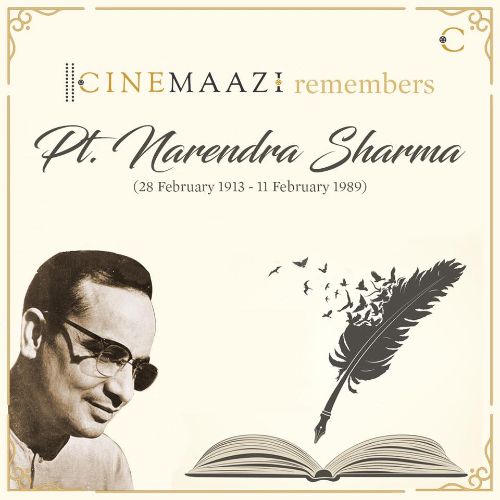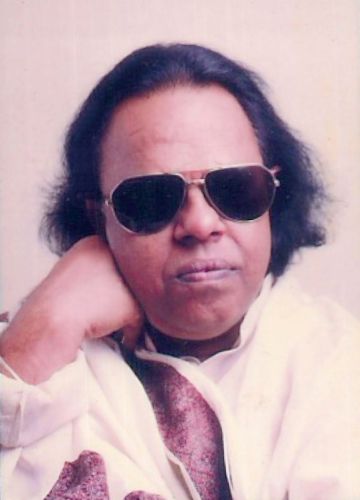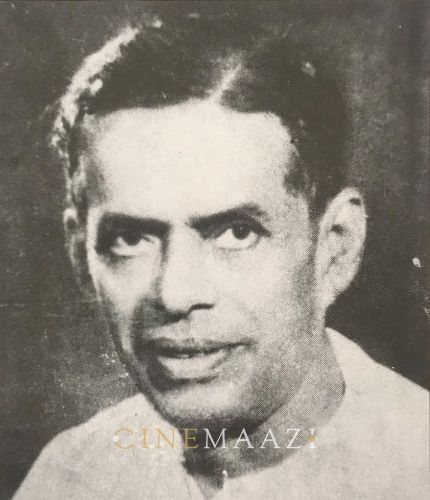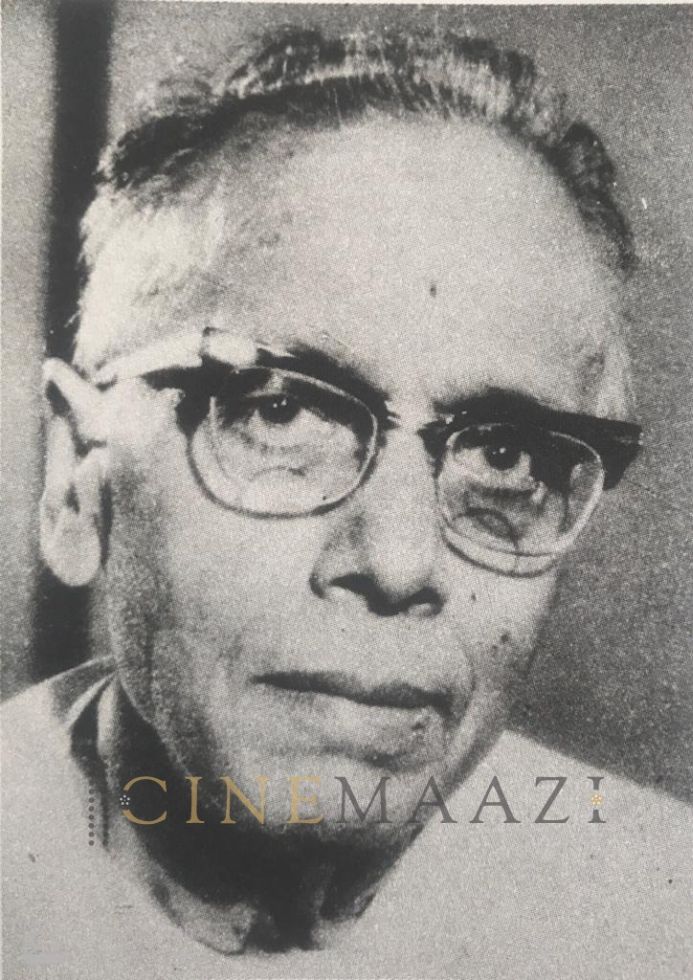Winner of the prestigious Dadasaheb Phalke award Bommi Narasimha Reddi was the first Indian Film personality to be honoured with a “Doctor of Letters”. He was also the first Indian Film personality to be honoured with the Padma Bhushan in 1974. Realism and the intense humanism continued to be a major part of his personality. ‘BN’ was a rare combination of experience, wisdom, humility and foresightedness and he strode the Telugu film Industry like a colossus for decades.
___________________________________________
Those were the days when men and women were treated worse than things found under stones after a rainy day. ‘Movie’ indeed was a dirty word, till B.N. Reddi changed all that, at least in South India. He brought respect and respectability to a field which was, in the words of a contemporary chronicler, ‘a beehive of pimps, prostitutes and perverts.’ Even the intellectuals began to take the new medium, ‘talkies’ as they called it, seriously.
‘Movie’ indeed was a dirty word, till B.N. Reddi changed all that, at least in South India.
It was warm summer day in Madras in 1939.
Vandemataram, B.N.Reddi’s first directorial venture was previewed at the Broadway cinema in the presence of the elites and intellectuals of Madras. The very physical presence of so many men and women of the Presidency town at a mere movie preview was by itself a telling evidence of the man who made the movie and his image. Bezawada Gopala Reddi, a poet himself, then a minister in the Provincial Cabinet, and later after independence State Governor, was the chief guest. And in the VIP-row sat Devulapalli Krishna Sastry, one of the top poets of Telugu literature (hailed as Milton of Andhra). He rose after the screening and remarked, “I say, this filmmaker seems to have some intelligence.” Gopala Reddi introduced the filmmaker to Krishna Sastry, who had contempt for films and thought it was just a pastime for the rich. But B.N.Reddi made such an impact on him that soon he got busy writing songs and dialogue for B.N’s films. And that was B.N.Reddi…..
Krishna Sastry, who had contempt for films and thought it was just a pastime for the rich. But B.N.Reddi made such an impact on him that soon he got busy writing songs and dialogue for B.N’s films.
BN, as he was affectionately called by all, came from a middle-class farming family, which moved to Madras to go into business. After his schooling there BN took to auditing. He worked for a well known Indian auditing firm as an apprentice and soon took his Diploma in Auditing. But his mind was not in double entries, depreciation and such mundane matters. He had shown a flair for histrionics even as a student and had even made attempts to study at Santiniketan. He had been associated with stage personalities like Bellary Reghavacharya, and Gudavalli Ramabramham. BN was a regular moviegoer. In the Crown Theatre in Madras he saw the early silent films and the early talkies. Slowly BN drifted to the world of lens and light and joined H.M.Reddi, another pioneer filmmaker of Indian Cinema, who made films in Kolhapur and Bombay before migrating to the greener pastures of Madras. Both of them made
Grihalakshmi (1937), where BN learnt the basics of film-making. He did not direct the film but wrote the scripts and contributed greatly to the success of the film. BN sincerely believed that every movie should convey a message.
Grihalakshmi, had a direct message on prohibition, a topic of public interest those days. The film included a scene of picketing of liquor shop and also showed national leaders of the time in person. BN included a song on the evils of drinking in the movie, “
Lendu Bharata veeru laara” (Arise! Warriors of India!) rendered by a newcomer to films,
Chittoor V. Nagaiah. The song became a ‘hit’ everywhere, sung even by drunks returning late home from their favourite haunts. One could see the oak in the acorns even in Grihalakshmi.
After the success of the Grihalakshmi BN promoted his own unit, Vauhini, which went on to create film history soon, and is still reckoned as a name to remember in South Indian cinema.
After the success of the above movie BN promoted his own unit, Vauhini, which went on to create film history soon, and is still reckoned as a name to remember in South Indian cinema.
Vandemataram, Vauhini’s maiden offering was directed by BN. Based on an unpublished novel of his, the film dealt with several issues that plagued South Indian society….unemployment…dowry system….in-law problems….the whole lot. The movie proved a big hit with the masses.
BN moved on to take another subject of social significance-widow remarriage. It was like playing with fire in those days, but BN went ahead with the making of
Sumangali (1940). Here, a bold educated man decides to marry a child widow against very heavy odds. BN drew inspiration from the work of Kandukuri Veeresalingarao, a great social thinker, and even had a character based on him in the film, played by V.Nagaiah. Nagaiah was made up to look like the original. A special silk wig was imported from Paris to make him appear old and credible – such was the passion of BN.
Sumangali was a very brilliant film technically. The credit goes to the great genius of Indian Cinema,
K.Ramnoth. But BN could not have expected this bold theme to bring money. He lost money, but he did not care. The film satisfied the poet, the social being and the message bearer in BN, and over the years the film became a classic-a subject of discussion at various levels.
BN moved on to take another subject of social significance-widow remarriage. It was like playing with fire in those days, but BN went ahead with the making of Sumangali (1940)
The failure of
Sumangali did not frighten BN. On the other hand it spurred him to greater frenzy of creative activity. He went one bold step ahead by planning a movie about pre-marital sex - something unthinkable in the early Forties. The mere thought was chilling, and even Ramnoth advised him not to go ahead with the movie. But BN did make the film -
Devata (1941). The movie was a smash hit all over, and made BN famous all over India. The talented filmmaker of the Hindi and Bengali screen like
Shantaram and
Debaki Bose, or even the Grand Old man of Indian Cinema, the D.W. Griffith of India,
Dadasaheb Phalke saw BN’s films with interest and praised the man and movie.
BN had tacked some important social issues in his first three movies. Here was a filmmaker, who could live well without making movies and yet had chosen to step into the quagmire. And he made movies of immediate significance and not of the love episodes from Hindu epics and folklore. He felt the medium should be used for social messages. BN who came from a middle class family had a very conservative outlook even though he had a progressive stance which found outlets in his films. Class distinctions provoked him. The importance attributed to family background by the society in the forties made an interesting topic for BN’s films.
Here was a filmmaker, who could live well without making movies and yet had chosen to step into the quagmire.
He drew inspirations from Shakespeare and Shaw too. And the result was his next movie,
Swargaseema. It was a major hit at the box office, and raised the heroine
Bhanumati to instant stardom….the commercial success of the movie established the business-man in BN.
Then came a lull for BN who took time off to build a studio of his own – Vauhini – in the style of Bombay Talkies.
In the fifties, BN came out with a historical movie,
Malleswari based on the King Krishnadevaraya of Hampi fame and considered by critics and crowd as his best.
Malleswari was a poem in celluloid, told with rare artistic finesse, which lingers long in the memory. BN is remembered best for his film, and he loved it that way.
In the fifties, BN came out with a historical movie, Malleswari based on the King Krishnadevaraya of Hampi fame and considered by critics and crowd as his best. Malleswari was a poem in celluloid, told with rare artistic finesse, which lingers long in the memory. BN is remembered best for his film, and he loved it that way.
Five years later, he again turned to West, this time to English literature. BN made
Bangaru Papa (1956) based on George Eliot’s ‘
Silas Marner’.
S.V.Ranga Rao, the great character actor, rose to fame doing the toughman’s role but the film was only a critical triumph for BN. Moneywise it ran into red….
Filmmaking trends in Telugu changed in the Sixties…star system gained strength…pictures were more expensive…distributors managed to get a strangle-hold-it was no longer an art form… it was business…big business. A sensitive artist with ideals suffered in silence watching the shifting sands…BN was no exception…BN made more films….
Bhagya Rekha…(1957)…
Raja Mukutam (1959)- a mixed bag. But for BN, it was a decline…everything seemed to have changed…Artistic films did not satisfy anyone anymore. Poor BN! He let himself go in a torrent of Telugu and English when friends called on him and talked about films. He spoke out his mind at intellectual gatherings but it was all lost…They praised BN at meeting and felicitations but that was all. Times had changed. BN sat in stony silence most of the time for the last decade of his life…
When people talk of good movies, of clean films, of purposeful cinema, BN is remembered, and his films like,
Sumangali, Malleswari, Bangaru Papa, Devata are screened, some go nostalgic…some give out deep sighs…and some shed silent tears. Sentimental folks long for the bygone days of glory that was Telugu cinema and that was BN Reddi.
-
Randor Guy
Reddi on Reddi
Vande Mataram was a transcription of my own novel which I had been writing quietly. Its main theme was the problem of unemployment of the educated and it also dealt with the evil practices of rural families, especially the dowry. K.Ramnoth who first suggested its filming wrote a superb screenplay. It was not autobiographical though I did have inspiration from the lives of my relatives in the village.
Vande Mataram was a transcription of my own novel which I had been writing quietly.
In one scene the hero tramples on his degree certificate and says: ‘Instead of wasting 15 years had I done some other job for 15 months or even 15 days I would have been better off’. This got me into trouble with the Censors. The Vice-Chancellor of Madras University, Mr. Ranganathan, and the Police Commissioner were asked to see the film and they asked me why I had to show a scene of disrespect to a degree. I told them that the hero was not normal when he did it. There were sensible people then.
My friend said Vande Mataram succeeded because of
Kanchanamala and not because of me.
_
So I decided to make
Sumangali (1940) with all new faces except for Nagaiah who played the role of an elderly man. In this film I showed the process of a woman being made a widow. This enraged our critics who said: “Sumangali must die to make an amangali a sumangali.”
P.C Barua happened to see it at a morning show in Calcutta and wrote to me: “One of the finest pictures I have seen.”
V. Shantaram who saw the film in Madras liked it immensely. Nagaiah was compared to Paul Muni.
P.C Barua happened to see it at a morning show in Calcutta and wrote to me: “One of the finest pictures I have seen.”
I made
Bhakta Potana in which
K.V. Reddi made his debut as director. Then came the first shock of the war. We shifted from Madras to Cuddappah. The fall of South-East Asia to the Japanese hit our business. We lost heavily. Against this background came separation from Ramnoth and Sekhar both of whom joined
S.S.Vasan’s new found banner Gemini. My friends said “Now B.N. is finished…”
I launched Swarga Seema. It was to be a turning point in my career
I launched
Swarga Seema. It was to be a turning point in my career. I had to work on the script. I took a stop watch and wrote and re-wrote sequence until I fixed a footage of 10800. P.Bhanumati became a star with this film. It netted Rs. 9 lakhs in Tamil Nadu. Rs. 1,80,000 in Kerala and one theatre in Bangalore alone grossed the total of 11 theatres in Andhra.
In this film I showed the decadence of art. One character says: I will cut art into pieces and offer them to you.” This is indeed what happened later.
-
I had some long years ago stayed in Hampi and the priest was so kind that he made me hug the idol. At the moment. I had recalled that where I was standing Krishnadeva Raya had once stood and prayed. I had then vowed someday to pay my tribute to the great king.
I had some long years ago stayed in Hampi and the priest was so kind that he made me hug the idol. At the moment. I had recalled that where I was standing Krishnadeva Raya had once stood and prayed. I had then vowed someday to pay my tribute to the great king.
I spent six to seven months in the Connemera Library acquainting myself with the period. I was particular about maintaining the authenticity of the period on the sets, costumes and dialogue. I requested noted archaeologist Mallampalli Somashekhara Sarma to approve the statues and noted classical poet. D. Krishan Shastry to pen the lyrics. This film introduced
N.T. Rama Rao as hero opposite Bhanumati.
This film introduced N.T. Rama Rao as hero opposite Bhanumati.
-
My beloved friend Vasan told me: “I make films for masses. You make films for me. But I have to wait long.”
Malleswari grossed eight lakhs – quite a big sum in those days – and in a rerun killed all the first-run films. A 16mm print was sent to the US. Some of the Universities there wanted to have its script as part of their textual studies. My beloved friend Vasan told me: “I make films for masses. You make films for me. But I have to wait long.” Vasan also asked me to dub it in Hindi. It was sent to China along with India’s first delegation. Russian film people attending India’s first international film festival also liked it.
After this I made
Bangaru Papa which won a State award. Ranga Rao’s performance was hailed by all. Debaki Bose remade it in Bengali and was reported to have lost heavily on it. I had already told him. “my fortune will not travel 1000 miles.” Talking to me at Mahabalipuram Debaki Bose asked me if I had any personal identification with the film. “If at all anything” I told him “it may be my three year old grandchild who is the only memory of my only daughter.”
This article is a reproduction of the original published in Ninth Indian International Film Festival Indian Retrospectives.







.jpg)


